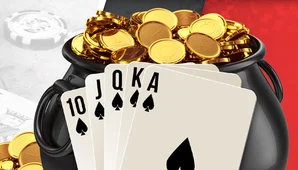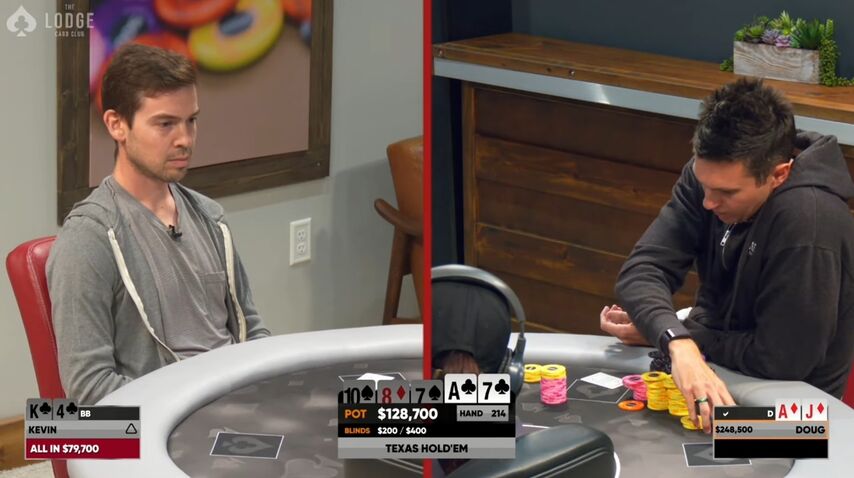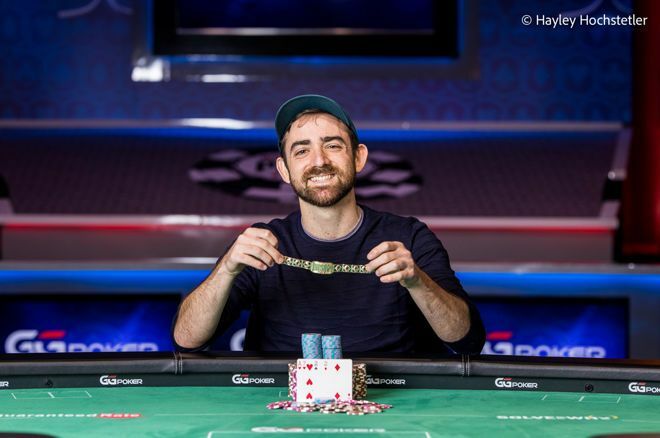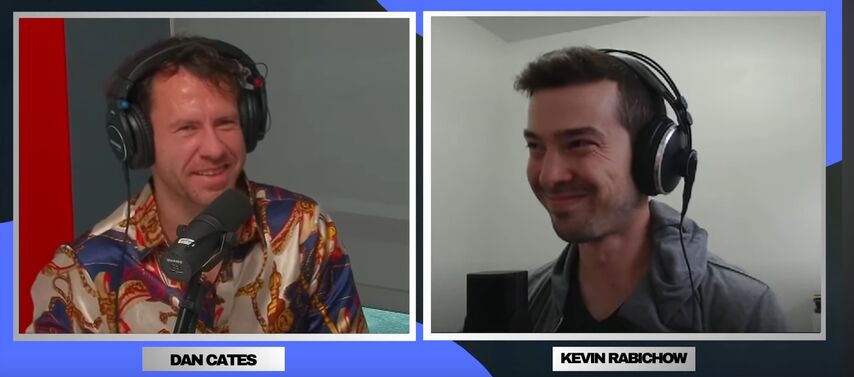A year and a half ago, Jungleman started hosting the Winning the Game of Life podcast. Since then, dozens of famous players have visited him, from Phil Galfond and Patrik Antonius to Maria Konnikova and Truteller.
A couple of weeks ago, heads-up guru Kevin Rabichow dropped by.
– Hi all! Today our guest is Run it Once coach, one of the strongest players in the world, a heads-up specialist who recently kicked Doug Polk’s ass – Kevin Rabichow! Did I mess up the pronunciation of your last name?
– Hello! Perfectly pronounced!
– Let's introduce you to the audience in more detail. Did you start straight away with heads-ups?
– Almost. I started playing online in 2007, at first I was just having fun, pressing random buttons. I switched to heads-ups about two years later. Somewhere around Black Friday, I graduated from university and threw myself into poker. Most of my career I played $25/$50 and $50/$100 – the highest heads-up limits that were on PokerStars. By 2017, I began to be interested in 6-max and MTTs: that is, today’s well-known heads-up players like Buttonclicker were just starting their careers, and I was already finishing. But even today I don’t miss the opportunity to play when they offer something interesting. That's what happened with Polk.



– And how? Do you have an advantage over old Doug?
– I thought there would be a slight advantage for me. Perhaps this is true. But how exactly can you know? Two days of 400 hands, the variance is huge. I didn’t really prepare myself to try to gain any serious advantage. He probably does too: Doug is a businessman these days, he has no time for that.
— You had some kind of crazy hand there when he showed AJ.
– Yes, I 3-bet K4s, and then 5-bet.
– I already like it!

-- You could probably bet the turn and river? The spot is so non-bluffing that Doug could theoretically fold AJ. But overall the hand is not terrible.
— Doug surprised me later when he said that in his strategy there are no 5-bets at all unless it’s a shove, regardless of the depth of the stacks. It still seems to me that if you have a 5-bet with AA in great depth (and why not?), then you should also have it with K4s.
— Everything according to GTO! What about the other stars you've played with in recent years? Fedor Holz? Michael Thuritz? I played with both of them – they are so eternally enlightened, like “I play as I feel”... You know what I mean? They don’t teach much theory, they don’t sit in simulators. Confident geniuses. And at the same time, sometimes they play in the wrong direction – and therefore it’s terribly disappointing when they also beat you.
– Yes, it was fun. About five years ago, several famous players suddenly decided to play a heads-up challenge, all with virtually no experience. You hit the nail on the head about the fact that it’s a shame for them to lose – Fedor simply crushed me then. He did wild things, completely ignoring the fundamental heads-up strategy. But at the same time, he played so viscously and aggressively that it was not very clear how to adapt. You sit and think: “What, should I 4bet call with AJo or something? Doesn’t seem to be any good.” And then you find out that he had J7o in this hand. That is, AJ was quite suitable! In general, in fact, you just guess how frostbitten a person is. I was still playing with Makeboifin at that time, it was a great match, and he was just beginning to master heads-ups.
– Who did you play with?
– Well, Makeboifin. The most expensive 6-max stakes. Marcus... The last name starting with “L” somehow slipped out of my head. A very tough opponent, but then he had the classic looks of a player who was too used to 6-max. Moreover, in parallel with our heads-up, he played tables 10 times more expensive on GGPoker, it was funny.
-Who is this again?..
— Let's talk about coaching. Who are you working with now?
— As a rule, my student is a successful poker pro who at some point hit the ceiling. This is exactly where I can help: I think I have a pretty good idea of what separates the top players from the average grinders. I help students understand where they are lacking and suggest what to do to get more edge. People spend too much time on all sorts of “interesting” hands and don’t really see the spots where EVs should actually be looked for. The main task of the coach is to open the players’ eyes to this.
— I recently spoke with Dylan Weissman. A top PLO coach, I trained with him myself, it was an amazing experience. And I told him that hold’em coaches take crazy amounts of money for no reason. And he replied: “Well, many yes, but there is Kevin Rabichow – he’s really good.” So what separates the average grinders from the top grinders?

– Thanks to Dylan! Look, there are two categories of regulars. The first ones fight for every spot and every pot, bite into hands with their teeth, trying to be the most difficult opponents possible every second. But the second ones don’t. Most grinders believe that in many spots there is no need to resist at all. Like “well, the situation here is not the best, the opponent has a range advantage,” blah, blah. And with this attitude, gradually one thing is superimposed on the other, and after some time bam – and you are already a nit who doesn’t fight for pots at all. When there is a table full of fish, you can get away with it, but in complex lineups, they start rolling over you.
Plus, most grinders have a very one-sided view of the game. So they learned something in PLO, sat in the simulators – and that’s all. But it’s not for me to tell you that poker is much more complicated than just knowing what a solver does in a given situation. You and I learned to play when there were no solvers, so we had to improve our soft skills. Young people today often do not understand this. You start asking the regs what they think your opponent was thinking about during the hand – and they don’t even know what you’re talking about. This is blowing my mind!
– Cool. But no one plays GTO perfectly anyway. I sometimes see dudes who clearly haven’t come out of the basement for many years, where they poked buttons in a solver, but there aren’t that many of them. Even in the most expensive MTTs, I don’t particularly see any wildly complex solver hands.
— Yes, and it’s very easy to confuse GTO fans too. Imagine a 6-max table where the fish is sitting to the left of such a guy. And so, let’s say, there’s a fish in the big blind, our hero is in the small blind, and the cutoff is open. And hero has no idea what to do! He remembers how the solver plays on the SB against the cutoff, but GTO won’t tell him how to adjust if there’s a fish on the left. Or how to get the maximum post flop, on which street. Let's say the fish is very passive, and we need to get money from it – when should we start attacking? The solver doesn't know. But extensive experience in heads-up play is an excellent school for exploitation.
-- People generally worry too much about how they should play instead of thinking about how to get the most out of a particular opponent. What other problems do your students have? Are you afraid to climb the limits? Are they tilting?
— Listen, students often hide psychological problems from their coaches. Online classes are the same way: they come to you with a specific request, and you help. It's not like we have a lot of heart-to-heart chats. But if they tell it themselves, then of course we discuss it. And if you need psychological help, I usually send you to trainers who specialize in this. But in the last year or two, I’ve been trying to understand this area myself, taking training from mental coaches.
— How did you get into MTTs? Have heads-ups become completely tough?
— It’s just that at some point MTT became more interesting to play and study. Tournaments have their own charm: you arrive, you pay the buy-in, you sit, everything is on schedule! Otherwise, it’s not clear when to leave the cash tables: it often feels like you should never leave.
— We’re talking about live MTT, aren’t we?
— Yes, in 2019 there was the first PokerStars PSPC series in the Bahamas, I really liked it there. Then I went to Partypoker LIVE, and that’s how it went. I was lucky to get there quickly, so I immediately started enjoying live tournaments.

And when the pandemic began, I played MTTs online for two years. Mainly in order to gain experience by the time live returned. I managed to get a boost, and my skill greatly improved, but since then I’ve hardly played online. I really like live poker: you travel around the world, meet people, it’s so cool. Well, tells are an important thing, of course. Online, I was often able to understand what was on my opponent’s mind, what mood he was in, whether he was tilting, and so on—but it was still a guessing game. And live everything is in full view.
— Do you remember any purely live situations that influenced your decisions at the table? Some crazy folds, for example?
— It’s more about small details. You study the trends of the field – for example, that on average people float the flop much less often than they should. Plus there are different patterns: how people play after they win a big pot or when their big bluff is called. And all sorts of very little things: for example, I just went to the EPT in Barcelona, and they gave me badges that are needed to enter the casino. And the professionals simply put them in their pockets, and some amateurs wore them around their necks all the time as if they were attending a conference. You see such a guy with a badge and you understand: for him, this tournament is a big event. And if this guy gets promoted, he won’t risk an extra chip at the last levels of the day. That’s it, you sit and 3-bet him until your hand gets tired.

– Haha! But there are also other players who are only spurred on by winning pots.
– Well, yes, of course, it is very important to see what type of player is in front of you. There are guys who don’t care about anything at all. I remember on the second day of one of the side events, a guy with a giant mountain of chips sat down at my table. And he lost it all in an hour, bluffing literally in every hand. It was opened, and in the next hand, it was raised again. It is very important to separate people for whom it is important to stay in the tournament and those who are ready to go home at any moment. Another common situation: a person has lost a decent part of the stack – and it’s clear that that’s it, he doesn’t hope for anything in this tournament anymore.
— Yes, and there are also tournaments where people simply don’t throw anything away — the WSOP Main Event, for example!
— Yeah, and not only tournaments but even specific levels. Let's say it's five o'clock on the first day, the dude is clearly not doing well – don't bluff him! He's tired and ready to gamble. And there are spots where people are not ready to fight for the pots at all: the last three hands of the day or the first hand after a break. Well, he just came from lunch, he’s not ready to cut himself to death! This is not science, of course, just observations.
– It sounds crazy, but okay! What are your next plans? Do you want to play PLO tournaments?
— I will continue to train, of course. Now I will play several tournaments online: WSOP Online, WCOOP Main Event, $10,000 heads-up. New formats are not particularly tempting to study – look how many huge Hold'em tournaments there are these days. But in general, both PLO and mixed games are interesting to me. In mixed tournaments, there is certainly someone big to play with. Really, two-time $50,000 Poker Players Championship champion?
— It’s also very important to classify opponents there. Some people don’t really know a specific game and start playing it wildly creatively, while others in this situation simply fold everything. There are enough of both. Badugi tournaments are free, I heard. Badugi, by the way, is one of the few limit games where you can have a huge edge. But okay, let's get back to your plans. What about live?
— I really want to win a tournament already, I have three second places in relatively large fields.
– Tiltovenko!
– And do not say! Especially for a heads-up specialist. My friends troll me about this. So I’ll play, mainly in the USA, and wait for the skid. In coaching, there is also something to strive for: collaborations with other mentors, interesting projects, and new students. There is room for growth everywhere, I like it.














